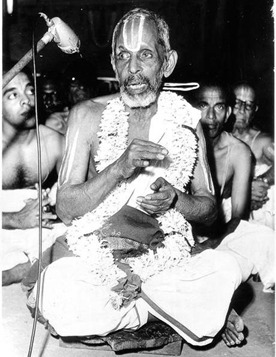Please note that this article is available in both Tamil (written by Sri APN Swami) and English (translation by his sishyas).

எல்லைப் பாதுகாப்பு
தேசாபிமானிகள் எல்லோருமே தீர்மானித்துள்ள ஒரு விஷயம்; "இனியும் சைனா தேசத்தின் பொருட்களை உபயோகிக்கக்கூடாது" என்று. இது மிகவும் வரவேற்புக்குரியது. நல்லதொரு நட்பு பாராட்டி, நன்கு வரவேற்று, நமது அரசு செய்த நல் உபசரிப்புக்கு மாறாக சைனாவின் விரோத மனப்பான்மை நன்கு வெளிப்பட்டுள்ளது அதிர்ச்சியளிக்கிறது. எல்லையைக் காக்க நமது தேச வீரர்கள் 20 பேர் இன்னுயிர் தியாகம் செய்ததை நினைக்கும் மனது வேதனையடைகிறது. அவர்களின் ஆத்மா சாந்தியடைய எம்பெருமானை நெஞ்சுருகி ப்ரார்த்திக்கிறோம். "எல்லைப் பாதுகாப்பு" குறித்து நம் ஸ்வாமி தேசிகன் அருளியதை இனி அனுபவிக்கலாம். ஸ்ரீமத் ரஹஸ்யத்ரைய ஸாரம் எனும் நூல் உயர்ந்த ஸ்ரீவைஷ்ணவக் கருத்துக்களை விளக்குவதற்காக சுவாமி தேசிகனால் அருளிச் செய்யப்பட்டது. அக்காலத்திலேயே இருமொழி கல்வி திட்டத்தை சுவாமி தேசிகன் கையாண்டுள்ளது குறிப்பிடத்தக்கது. இந்நூலின் முக்கிய கருத்தான சரணாகதியை நன்கு விளக்குகிறார். குறிப்பாக பகவானான நாராயணனுக்கே நாம் அடியவர்கள் எனும் ஸித்தாந்தம் வலியுறுத்தப்படுகிறது. இதில் "நமது பக்தி அதாவது பகவானுக்கே தாசர்கள் (ஆட்பட்டவர்கள்) என்பதின் அளவு என்ன?" எனும் கேள்வி உண்டாகிறது. இதன் விளக்கத்தைச் சற்று கவனித்தால் கட்டுரைத் தலைப்பின் முக்கியத்துவம் புரியும். அதாவது நாம் பகவானுக்கு மட்டும் தாசர்களா? அல்லது நமது தாசத்வம் - அடியேனாகும் தன்மை மேலும் விரிவடைந்து மற்றைய எவருக்காவது தாசர்களாகிறோமா? எனும் கேள்வியை இங்கு எழுப்ப வேண்டும். இவ்விஷயத்தில் தீர்ப்பளிப்பவை சாஸ்திரங்கள் தானே. பகவத் தாஸத்வம் - பகவத் பக்தருக்கு அடியவராகும் வரை எல்லையாயுள்ளது. ஆம், நமது அடியேனாகும் எல்லை பாகவதர் வரையிலும் உள்ளது. "அடியார்க்கு என்னை ஆட்படுத்தும் விமலன்" - "பகவத் தாசனாகிய என்னை, அந்த பகவான் அவனது அடியார்க்கும் அடியேனாக்கினார்" என்கிறார் திருப்பாணாழ்வார். எனவே நமது தாசனாகும் எல்லை பாகவதர்களேயாவார். அதெல்லாம் முடியாது. நான் பகவானுக்கு மட்டுமே தாசன். அவன் அடியார்க்கு இல்லை" என்று முரண்டு பிடித்தால் என்னவாகும்? என்பதை தேசிகன் எல்லைப் பிரச்சனையை உதாரணமாக்கிக் காட்டுகிறார். ஒரு கிராமத்தின் எல்லை நிலம் தரிசு பாய்ந்துள்ளது. தரிசு என்றால் கவனிப்பாரற்று, சமன்படுத்த படாமல், முள்ளும், கல்லு மாய் இருக்கிறது. இதனால் அத்தரிசு நிலத்தை ஒட்டியுள்ள பகுதிகளுக்கு பல ஆபத்துக்கள் உண்டாகும். அதாவது மழைநீர் வெள்ளம் பாயலாம், அல்லது கள்ளிச் செடிகள் உண்டாகி முக்ய பயிரை அழிக்கலாம், அல்லது தரிசுக் காட்டில் புதர்கள் மண்டி விஷ,கொடிய ஜந்துக்கள் உண்டாகலாம், குற்றங்கள் நடக்கும் வாய்ப்புகளுண்டு. இவை எல்லாவற்றையும் விட முன், பின் கிராமங்களுக்கு இடையே எது எல்லை? என்பதில் பெறும் தகராறு உண்டாகும். ஆகையால் எல்லை நிலத்தை தரிசு-கரம்பு(waste land) நிலமாக அலட்சியப்படுத்தாமல், அதை நன்கு கவனித்து செப்பனிட்டு பாதுகாத்து வந்தால், உள் நிலமும் நன்னிலமாகத் திகழும். எனவே எல்லை பாதுகாப்பு இன்றியமையாதது. அதை waste land என்று தள்ளிவிட முடியாது. அதுபோன்றே தற்போது பகவத் பக்தி மட்டும் செய்து வந்து, பாகவத பக்தி (பெரியோர்களை பூசிக்காமல்) செய்யாமலிருந்தால் எல்லை நிலத்தை தரிசு பாய விடுவது போன்று ஆபத்தாகிவிடும் என்கிறார் சுவாமி தேசிகன். எல்லை கடப்பது எவ்வளவு தீயதோ! அஃதுபோன்று, எல்லையைக் காப்பதும் இன்றியமையாததன்றோ! இதை நன்கு கவனத்தில் கொண்டு நாமும் எல்லை பாதுகாப்பில் இணைந்திடுவோம். தேசிய பக்தியும், தேசிக பக்தியும் நமது உயிரன்றோ! இக்கட்டுரையின் கருத்திற்கு வித்திட்ட ஸ்ரீ உ.வே. நாவல்பாக்கம் வாசுதேவாசாரிர்யார் சுவாமிக்கு ப்ரணாமங்கள். -ஸ்ரீ ஏபிஎன் சுவாமி.
18/06/2020

To Glorify Bhagawan, Glorify His Devotee
English
Border Security
All the patriots have unanimously decided not to use Chinese products again. This is a welcome move. Our government praised a good friendship and extended a warm welcome to China, but such an outburst of antagonistic thoughts by China is shocking. This grief gets even compounded when we think of the 20 soldiers who have laid down their life fighting for our country. We pray fervently to Emperuman to give peace to their souls.
Now, let’s read what Swami Desikan has said about border security. Swami authored a book called Srimad Rahasya Traya Saram to enshrine the highest principles of Vishishtadvaita. Since this book contains a combination of Tamil and Sanskrit, it reflects the two-language system that had been in vogue then. This grantham lays a lot of emphasis on Saranagathi. In particular, it explains the master-follower relationship between Sriman Narayana and us. In this, what is our bhakti? In other words, what is the limit of our acceptance of Bhagavan’s mastery over us? (Clue: The answer to this question relates to the title of this article).
Are we followers of only Emperuman or does it extend to others as well? This is the question that we should raise here.
The verdict or the answer to this question lies in our sastrams. The limit of Bhagavad Dasavatham (followership of Bhagavan) extends to the followership of His devotees.
Yes, our Dasathvam extends to His devotees as well. In Amalanadhipiran, Thiruppan Azhwar says. “Adiyaarku ennai aat paduththa vimalan.” This means, He ensured that I was not only His follower but also the follower of His followers. So the limit of our Dasathvam will be His devotees/followers.
So, what happens if we argue that we are His followers only and not the followers of His devotees also? Swami Desikan sees this question as a border problem and answers it for us.
The border of a village extends up to a land that is not taken care of by anyone (waste land), so it is full of thorns and stones due to which, it can be dangerous for the lands that border it. Some possible hazards could be floods, growth of weeds that can affect the crops of the adjoining lands, presence of poisonous creatures, and the possibility for nefarious activities. More than all this, there will always be a question of which village has claims over this wasteland.
This is why we should ensure that the lands bordering a place should be well-maintained to avoid the above problems and hence border security becomes a crucial part of any administration. These areas can never be ignored as wastelands.
Likewise, if we are devotees only to Bhagavan and not to His followers, we open the possibility of our borders to become wastelands, explains Swami Desikan. Just like how transgressing a border is dangerous, like that ignoring the borders is also equally dangerous. Let’s keep this in mind and become a part of the border security force. After all, Desha Bhakti and Desika Bhakti are our two eyes!
Salutations to Navalpakkam Vasudevachariar Swami for seeding these thoughts.
-Translation by Sri APN Swami Sishyas
